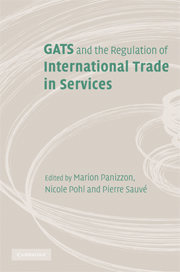Book contents
- Frontmatter
- Contents
- Contributors
- List of figures
- List of tables
- List of abbreviations
- Preface
- PART 1 Beyond regulatory control and multilateral flexibility: Gains from a cosmopolitan GATS
- PART 2 Unexplored economic, political and judicial dimensions of GATS
- PART 3 The limits of request–offer negotiations: Plurilateral and alternative approaches to services liberalisation
- PART 4 GATS case law: A first assessment
- PART 5 Market access, national treatment and domestic regulation
- PART 6 Unfinished business: Safeguard and subsidy disciplines for services
- 18 Recognition, standardisation and harmonisation: Which rules for GATS in times of crisis?
- 19 A safeguards regime for services
- 20 Waiting for Godot: Subsidy disciplines in services trade
- 21 Comment: One set of rules for fair and unfair trade in services: A possible merger?
- PART 7 Challenges to the scope of GATS and cosmopolitan governance in services trade
- PART 8 Conclusion
- Index
- References
20 - Waiting for Godot: Subsidy disciplines in services trade
from PART 6 - Unfinished business: Safeguard and subsidy disciplines for services
Published online by Cambridge University Press: 03 September 2009
- Frontmatter
- Contents
- Contributors
- List of figures
- List of tables
- List of abbreviations
- Preface
- PART 1 Beyond regulatory control and multilateral flexibility: Gains from a cosmopolitan GATS
- PART 2 Unexplored economic, political and judicial dimensions of GATS
- PART 3 The limits of request–offer negotiations: Plurilateral and alternative approaches to services liberalisation
- PART 4 GATS case law: A first assessment
- PART 5 Market access, national treatment and domestic regulation
- PART 6 Unfinished business: Safeguard and subsidy disciplines for services
- 18 Recognition, standardisation and harmonisation: Which rules for GATS in times of crisis?
- 19 A safeguards regime for services
- 20 Waiting for Godot: Subsidy disciplines in services trade
- 21 Comment: One set of rules for fair and unfair trade in services: A possible merger?
- PART 7 Challenges to the scope of GATS and cosmopolitan governance in services trade
- PART 8 Conclusion
- Index
- References
Summary
Introduction
Although it covers subsidies directed towards industrial and agricultural goods, the WTO framework does not yet contain specific disciplines for services subsidies. Article XV of the General Agreement on Trade in Services (GATS) requires Members to develop the multilateral disciplines necessary to avoid the distortive effects subsidies may have on trade in services. However, these negotiations, which have been taking place in the Working Party on GATS Rules (WPGR), have not progressed significantly since they began in 1995. The challenge confronting WTO Members in this area is of considerable complexity. Services and trade in services differ significantly from goods and trade in goods. Their salient characteristics, such as invisibility, non-storability and intangibility, and the existence of multiple modes of supply, have a profound impact on the elaboration of possible disciplines.
The Negotiating mandate of Article XV
Limited negotiations on the possible introduction of disciplines on service subsidies took place during the Uruguay Round. Having been unable to reach an agreement prior to the end of the Round, negotiators agreed to defer the issue of subsidy disciplines in services to the then newborn WTO. The negotiating mandate of GATS Article XV states that
Members recognize that, in certain circumstances, subsidies may have distortive effects on trade in services. Members shall enter into negotiations with a view to developing the necessary multilateral disciplines to avoid such trade-distortive effects. The negotiations shall also address the appropriateness of countervailing procedures. Such negotiations shall recognize the role of subsidies in relation to the development programmes of developing countries and take into account the needs of Members, particularly developing country Members, for flexibility in this area. For the purpose of such negotiations, Members shall exchange information concerning all subsidies related to trade in services that they provide to their domestic service suppliers.
- Type
- Chapter
- Information
- GATS and the Regulation of International Trade in ServicesWorld Trade Forum, pp. 466 - 488Publisher: Cambridge University PressPrint publication year: 2008
References
- 8
- Cited by



